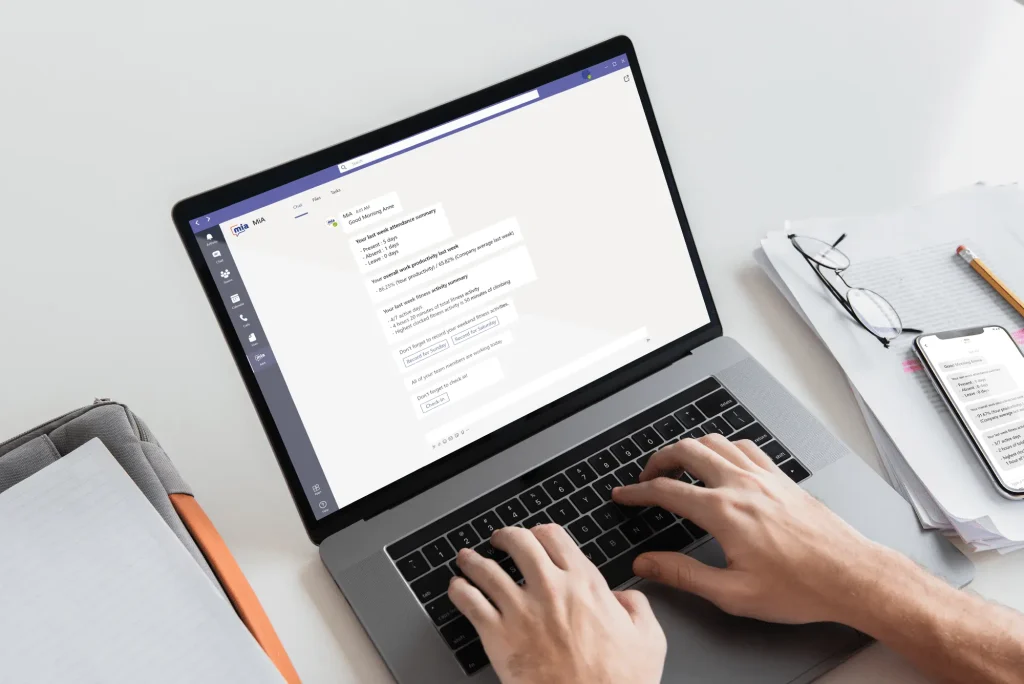HR chatbots have emerged as a pivotal force in transforming HR operations, leading the charge in technological adoption within the workplace.
These AI-powered virtual assistants streamline tasks, enhance employee engagement, and foster efficient decision-making processes.
As the demand for effective HR solutions grows, MiHCM’s comprehensive suite integrates seamlessly with chatbot technology to modernise HR management.
By leveraging HR chatbots, companies unlock numerous benefits, such as improved recruitment processes, enhanced performance management, and increased operational efficiency.
As organisations strive for digital maturity, integrating chatbots ensures progress in achieving strategic HR goals, reinforcing their position as indispensable tools in contemporary HR settings.
The implementation of HR chatbots has revolutionised the recruitment landscape for many multinational companies. These chatbots act as virtual assistants, automating repetitive administrative tasks, improving operational efficiency, and enhancing HR processes.
Case Study: Tech industry
One notable example comes from a leading global tech company that integrated HR chatbots into their recruitment process. By leveraging AI-powered chatbots, the company significantly reduced the time and cost associated with hiring.
Chatbots were used to pre-screen candidates, answer FAQs, schedule interviews, and provide status updates. This not only expedited the hiring process but also improved the candidate experience, leading to a higher rate of accepted offers.
The tech industry, known for its rapid pace and competitive nature, benefits immensely from such enhanced recruitment efficiencies.
HR chatbots streamline the administrative load, allowing HR teams to focus on strategic initiatives, boosting team productivity, and improving overall employee engagement.
Case study: Healthcare sector
In the healthcare sector, HR chatbots have been deployed to address high turnover rates and improve staff onboarding.
For instance, a leading healthcare provider utilised chatbots to automate the onboarding process, guiding new hires through necessary documentation, compliance training, and introductions to company policies and culture.
This not only made the onboarding process more efficient but also reduced the time taken for new employees to become productive members of the team.
Industries like healthcare, which require a meticulous approach to recruitment and training, appreciate the seamless integration of chatbots in daily HR operations. The result is a more engaged workforce and a smoother transition into the demanding healthcare environment.
For businesses adopting this technology, these case studies highlight the focus keyword, HR chatbot benefits, demonstrating how chatbots enhance recruitment efficiency and employee success across different sectors.
Implementing HR chatbots demands a carefully considered strategy to unlock significant operational improvements and employee engagement enhancements.
Companies aiming to integrate AI-driven chatbots can benefit from tried-and-tested approaches that streamline the process and maximise the impact of these digital tools.
Strategy 1: User-centric design

A user-centric design is pivotal in ensuring that HR chatbots meet the actual needs of employees.
Tailoring the chatbot’s functionality to address common queries and streamline routine tasks can result in higher adoption rates and seamless integration.
Businesses can leverage tools such as those offered by MiHCM to develop a focused solution that simplifies HR requests and approvals.
By ensuring ease of use and relevance to employee needs, organisations can facilitate a smoother transition to these AI-driven tools, ultimately improving operational efficiency.
Strategy 2: Data security protocols
Given the sensitivity of HR data, robust data security protocols are non-negotiable when deploying HR chatbots.
Organisations should implement stringent security measures to protect employee data from breaches, ensuring compliance with relevant regulations.
Leveraging the encryption and secure data-handling capabilities found in MiHCM’s solutions can enhance trust and reliability, making the transition smoother for apprehensive stakeholders.
- Integration with existing systems: Successful HR chatbot integration often hinges on seamless compatibility with existing HR management systems. Utilising platforms that offer API integrations and custom workflows ensures that chatbots can effectively communicate with existing HRIS systems.
- Regular training and updates: Continually updating AI models and training datasets ensure that chatbots remain relevant and accurate in providing information. Regular maintenance and updates help in adapting to new policies or employee feedback, ensuring the chatbot evolves with the workplace culture.
- Clear communication and support: Establishing clear communication channels for feedback and providing ongoing support helps address any usability concerns quickly. Organisations can offer guidance through internal training sessions to familiarise employees with the new tool, fostering confidence and proficiency.
The success of HR chatbots relies not only on technology but also on the strategic initiatives surrounding their deployment.
Harnessing these tools effectively provides companies with the capacity to make data-driven HR decisions, enhancing not only operational efficiency but also smarter spending decisions, thus fortifying a workplace that is both agile and responsive to changing needs.
Measurable improvements

- Increased efficiency: HR processes saw up to a 30% reduction in workload due to automation of repetitive tasks, as evidenced by data from the tech industry. This freed HR professionals to focus on strategic tasks, consequently elevating their overall productivity.
- Enhanced employee satisfaction: Polls indicate a 25% increase in employee satisfaction scores, with chatbots providing timely responses to HR inquiries and easing onboarding processes. This directly correlates with higher employee engagement levels.
Qualitative impacts
- Improved organisational culture: Through persistent engagement and support, chatbots have fostered a more inclusive and supportive work environment. Employees reported feeling more connected and supported by the HR functions.
- Seamless integration with HR systems: The adaptability of chatbots to work seamlessly with existing HR systems has streamlined operations, mitigating resistance to adopting new technology among staff.
Cost savings and productivity gains
- Significant cost reductions were noted, with up to 20% savings on recruitment and onboarding expenditures. The automation of these processes minimised the need for manual intervention, thus lowering operational costs.
- Productivity gains were also prominent, showcasing a notable reduction in turnover rates in sectors like healthcare, where chatbots supported continuous employee engagement and retention strategies.
By quantifying these benefits, companies can see the value HR chatbots bring to transform traditional workflows. This level of digitalisation not only drives down costs but also enhances employee experiences, demonstrating the varied advantages of integrating chatbot technologies.
Invaluable insights
The exploration into HR chatbot case studies provides invaluable insights for companies considering similar technological integrations.
The highlighted success stories demonstrate the myriad benefits – ranging from enhanced employee engagement to improved recruitment efficiency – that HR chatbots can introduce.
- Enhanced employee engagement: HR chatbots streamline communication and engagement, allowing employers to connect better with their workforce and foster a more supportive work environment.
- Data-driven HR decisions: By leveraging AI capabilities, HR teams can make more strategic decisions, backed by real-time analytics provided by integrated tools like MiHCM’s comprehensive HR solutions.
- Operational efficiency: The deployment of chatbots enhances the seamless recruitment process, reducing the burden of repetitive tasks and freeing HR professionals to focus on core strategic initiatives.
These case studies encourage embracing HR chatbots as a pivotal part of the modern workplace.
As AI continues to evolve, its integration within HR paves the way for increased productivity, cost-effectiveness, and a transformative impact on organisational culture.
For those looking to enhance their HR operations, the proven success stories clearly illustrate the potential benefits awaiting adoption.



